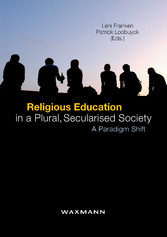Suchen und Finden
Service
Contents
6
Introduction
8
Religious Education in a Religiously Pluralised and Secularised Society
10
Part I: Different Models of Religious Education in Europe
16
Situation and Current Developments of Religious Education in Europe
18
1. Introduction
18
2. Key Characteristics of Religious Education in Europe
19
3. European Developments
26
4. Perspectives
32
Religious Education in Belgium: Historical Overview and Current Debates
36
1. Introduction
36
2. Historical Overview
37
3. Some (Impressive) Facts and Figures6
43
4. Practical Problems
46
5. The New Sociological Situation
48
6. Struggling and Coping with Depillarisation, Diversity and Secularisation
50
Teaching about Religious Issues within the Framework of the French “Laïcité”
56
1. The Principle of Laïcité: Church, State and School
56
2. Towards Awareness of the Necessary to Stress More on Teaching about Religious Issues
59
3. Teaching about Religious Issues within the Schools
63
4. Conclusion
66
References
66
Without Fear or Favour: Forty Years of Non-confessional and Multi-faith Religious Education in Scandinavia and the UK
70
1. ‘Without Fear or Favour’
70
2. Forty Years of Non-confessional-multi-faith Religious Education
70
3. Why did Non-confessional, Multi-faith Religious Education Develop?
72
4. The Influence of Phenomenology
73
5. Forty Years Later
75
6. Forty Years Later in Non-confessional, Multi-faith Religious Education
76
7. Varieties of Non-confessional, Multi-faith Religious Education
77
8. The Lessons of Forty Years
81
10. Remaining Questions
83
11. Conclusion
83
References
84
Religious Education in a Pillarised and Postsecular Age in the Netherlands
86
1. Introduction
86
2. From State-Protestantism to Pillarisation
87
3. From a Pillarised to a Post-secular Society
88
4. Positioning Religion(s) in Denominational Schools: Current Situation and Trends
90
5. Education of Encounter
93
6. Squaring the Circle: Religious Citizenship Education
94
7. Concluding Remarks
96
References
97
Religious Education in Norway
100
1. Introduction: Obligatory Integrative Religious Education – the Norwegian Context
100
2. Religious Education in Norway until the 1990s: the Emergence of a Separative Model2
101
3. The Introduction of Integrative Religious Education in the 1990s
103
4. Norwegian Integrative Religious Education and International Law: the Human Rights Issue
106
5. Religion, Livssyn og Etikk (RLE): the Revised Subject of 2008
109
6. Conclusion: Obligatory Education about Religions in Contemporary Plural, Secularised Societies
111
References
113
Part II: Should Religious Education be Part of the (State) School Curriculum? Three Normative Views
116
Dialogue Needs Difference: The Case for Denominational and Cooperative Religious Education
118
1. Denominational Religious Education in Educational Perspective
118
2. Should Denominational Religious Education be Part of the (State) School Curriculum?
119
3. Dialogue and Difference
122
4. Different Approaches to Dialogue in Religious Education
123
5. Perspectives for the Future: Different Paths towards Dialogical Religious Education in Different Locations?
128
References
129
Why Religion Education, as a Matter of Course, ought to be Part of the Public School Curriculum1
132
1. Why Religion must be Studied and Taught about – Fundamentals
132
2. A Compulsory, Separate Religion Education: Fundamentals
141
3. Final Remarks and Arguments
145
References
148
Why Religious Education should not be Exclusively Religious
152
1. Introduction
152
2. The Five Models Briefly Introduced
153
3. Religious Education and Secularism
157
4. Traditional Secularism and Secularism Renewed
158
5. Secularism and Criticism of Religion
159
6. The Implications of Free Debate on Religion for the State Curriculum
160
7. The Implications of Secularism for Religious Education
163
References
164
Conclusion
168
The Challenges of the Paradigm Shift in Religious Education
170
1. The Importance of National Contexts
170
2. A Shift in Paradigm
172
3. Convergences
173
4. Challenges and Discussion
175
5. Conclusion
177
Biographical Details
178
Alle Preise verstehen sich inklusive der gesetzlichen MwSt.










